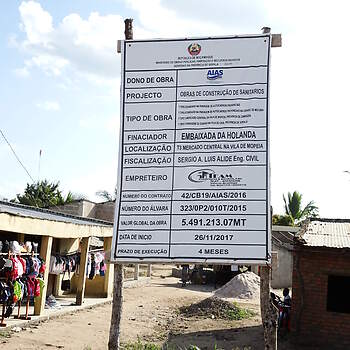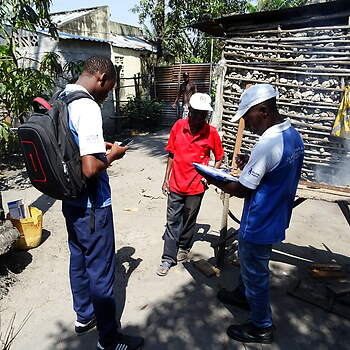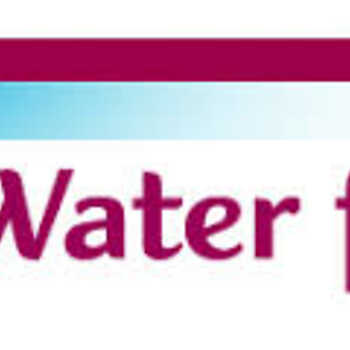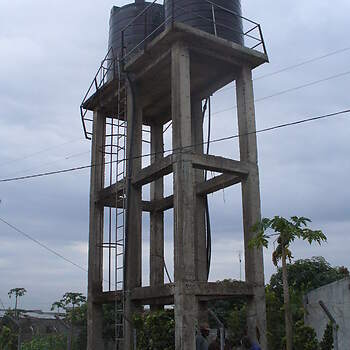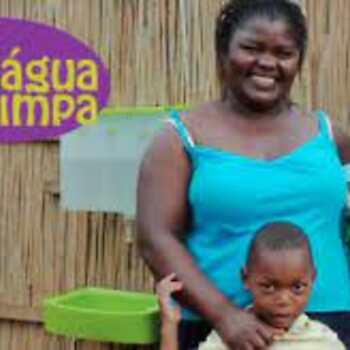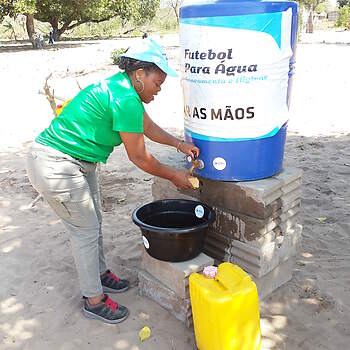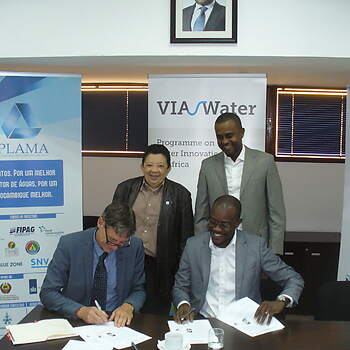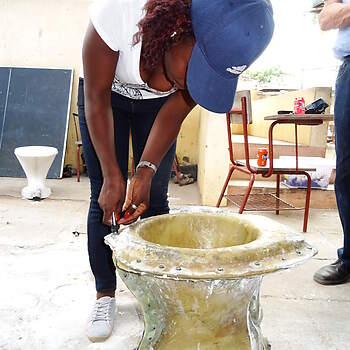Dutch political shift
Shortly after 2010, the Dutch development cooperation was redefined. Partner countries that showed a remarkable economic growth with the potential to grow away from the status of low income country were classified as transition countries. Here, aid would phase out and transition funding would prepare these countries for more balanced trade relations. Mozambique was categorised in that group, because of the looming economic growth based on the export of fossil fuels (coal and gas). Meanwhile, a thematic focus on water was maintained.
Due to the general commodity crisis in 2015 and the Hidden Debt Scandal in 2016, the continuation of the transition agenda became less appropriate.
Water focus
For the changes at the level of the Dutch water cooperation, guidance was given by the then state secretary Ben Knapen in a Water letter (2012). In this policy paper private sector participation, PPPs and ‘delta-focus’ were prevailing, next to the more general MDG7 agenda. For PPPs in water, a new instrument was published (the Sustainable Water Fund). Water had become one of the ‘brands’ of the Netherlands. Dutch water solutions were sold as among the best in the world. Some researchers are critical about the sense of superiority behind this branding and calls for good pre-assessments on the appropriateness of promoted Dutch sulutions in the given context (Mukhtarov et al 2022). From its International Water Ambition, the Dutch water lobby had developed a delta-oriented programme (called ‘Water Mondiaal') and Mozambique was with Egypt the only African country in this delta programme. Almost all international funding instruments of the Dutch government could be used in the ’aid’ relationship with Mozambique.
Integrated Water Resource Management
After 2010, the Dutch support to IWRM continued. Initially, the Sector Wide Budget support (ASAS) became more specifically for IWRM (next to Institutional support to DNA) In fact it became more programmatic and could hardly be called Sector Budget support, anymore. But the Dutch dissatisfaction remained with the way the funds were spent. The Hidden Debt scandal in 2016 meant the real end of any form of budget support. A new IWRM programme was designed with a more prescribing programmatic approach, in which a lot of control was built in. Additional Dutch funding was given to ARA-Zambeze, Blue Deal and the initiatives to make Beira a more resilient city. The Netherlands is also investing in studies for coastal protection of Beira. A separate IWRM project was implemented by World Nature Fund, called Environmental Flows Zambeze. It received 0.5 million Euros in the period 2010-2014.
Partnership building
To improve the cooperation (and understanding) between public and private entities in the water sector, the organisation PLAMA was created in 2011, and initially supported by the Dutch programme ‘Water Mondiaal’. To a certain extend PLAMA was copying some aspects of the Netherlands Water Partnership (NWP), which was using PLAMA as an entry point for its activities in Mozambique. The organisation was not able to get a legal status, however.
Big cards for water in large towns
Support to the urban water supply and sanitation was continued, especially with FIPAG and VEI in a partnership. Big pledges were made to World Bank programmes, such as 26 million Euros for WASIS-II and 60 million Eurso for the rehabilitation programme following Idai and Kenneth cyclones in Central Mozambique. A big ORIO funding of 23 million Euros weres provided for the expansion of the water supply for the Greater Maputo area.
AIAS model embraced for small towns
In 2013, the Embassy started the support of a small towns WASH programme through AIAS, in partnership with Vitens Evides International, World Waternet, SNV and BOP Inc. The set-up matched well with the initial limited capacity of AIAS. Starting with a programme for 15 towns (PO15), it was followed with a project for 35 towns (PO35) and is now with 70 to 75 towns (PO75), already covering more than half of the towns under the AIAS mandate. Contracted operators grow into their roles. The coverage in these towns and villages is slowly increasing; most schemes are still concentrated in the town centres, while only a few Operators are investing in new extensions.
Cooperation in urban sanitation
In 2009, AIAS also got the mandate for urban infrastructure for drainage and sanitation. The above mentioned AIAS projects had a sanitation component, but this got momentum in the beginning of the 20s, only. Initially, AIAS focused on some major drainage works, such as those in the city of Beira, financed by the World Bank and the Netherlands.
More emphasis on on-site sanitation was given by the Frysian Urban Sanitation Project (FUSP), which lasted from 2010 till 2017. The Dutch partners were based in the province of Friesland (Fryslan) and consisted of the Water Authority (Wetterskip Fryslan), the drinking utility Vitens and the Provincial and Municipal Administrations. With its sanitation focus, the Dutch project title ‘Clean drinking water for Mozambique’ did not really reflect the sanitation focus. The project included sanitation planning, institutional development, private sector involvement, hygiene, and school facilities and was concentrated in the South and Central part of Mozambique. School WASH was also covered in the Football for Water programme (2014 – 2019), in which Mozambique was one of the three participating countries.
Rural WASH phased out
The Dutch support to rural programmes, which restarted in 2006, was phased out in the midst of this decade, despite of the fact that PRONASAR had gone in a desired direction, and a generally positive impact evaluation by IOB in 2011. In 2014, the funding was brought under a common fund that was managed by an ‘external’ party (first UNICEF, thereafter SNV) and with a more efficient mechanism for contracting out of small works. Such a common fund has the capacity to attract funding from other donors; but also provided the opportunity for a main donor to step out without too much damage. After a first pledge, the Netherlands stopped its further commitment, primarily because of a long-expressed desire for more focus in the water portfolio (i.e. IWRM and urban WASH).
Many more projects
The formal Dutch policy was to maintain focus through a limited number of contracts. But the large number of different initiatives continued. To name a few: Partners voor Water, Water Mondiaal, DRIVE and Fonds Duurzaam Water continued to stimulate private sector involvement in Mozambique; Mozambique was with Ghana and Kenya selected for the Football for Water programme and Mozambique was among the 7 countries selected for the water innovation programme called VIA Water. Education programmes in water continued under NUFFIC (e.g. in NICHE and Orange Knowledge) and a new programme, called DUPC with IHE.
Reflection
For Mozambique, the water branding of the Netherlands and the long-standing outputs of Dutch experts have been truly relevant. The Netherlands is perceived as a dependable partner with a high profile in the water sector. It started with the many ‘cooperantes’ in the 70s and 80s. From 1995 onward, the Netherlands took a prominent role in donor coordination, together with the World Bank and UNICEF. The continued engagement of former expats, the presence of several Dutch actors, the fact that many Mozambican experts have been trained by the Dutch or in the Netherlands and the institutional focus is contributing to this respected position.
Nevertheless, the relationship was often challenged. Some of the Dutch new policies were really imposed without a balanced negotiation and preparation. Dutch expectations were not always realistic, like with the Sector Wide Budget approach, the Privatisation Agenda, and the Aid&Trade switch. The position of the Mozambican government is also not easy, as it is still heavily dependent on donor aid and has no real option to resist or adjust all these trends and fashions. It has no other choice than to accept and see where the wall turns the ship. Meanwhile, certain choices serve the interests and priorities of the strongest parties.
References
Deltateam Water Mondiaal (2011). Perspective for action for implementing the Water Mondiaal program in Mozambique (draft version 20 July 2011; LINK follows).
DHV (2011). Market Scan Mozambique. Challenges and Opportunities for the Dutch Private Water Sector. Den Haag/ Amersfoort: commissioned by Partners voor Water, Agentschap NL (Pietersen, W.; hard copy only)
FUSP (2010-2017) Six project Fact sheets on the Frysian Urban Sanitation Project (overall ENG/PORT, factsheet Institutional Development 1ENG/1PORT , factsheet household sanitation 2ENG/2PORT, factsheet school sanitation 3ENG/3PORT, factsheet Env Protection 4ENG/4PORT (LINK follows], factsheet Private Sector dev and micro-fin 5ENG/5PORT)
GOM (2011). Estratégia Nacional de Água e Saneamento Urbano 2011-2025; MOPH, aprovada pelo Conselho de Ministros na 42a sessão de 22 de Novembro 2011; Portuguese only
GOM (2016). ‘Política de Águas’; in: Boletim da República, Número 156, Resolução No 42/2016 de 30 deDezembro de 2016; Portuguese only
GOM (2017). Action Plan of the water sector to implement the Sustainable Development Goals, Vol 1: Water Resources Management; MOPH/DNGRH
GOM (2018). ‘Plano de Acção do sector de Águas para implementação dos objectivos de desenvolvimento sustentavel 2015-2030’; in: Boletim da República, Número 207, Resolução No 40/2018 de 24 de Outubro; Volume I Recursos Hidricos (pg 2623-2658); Volume II Abastecimento de Água e Saneamento (pg 2658 – 2709; anexos 2710-2714)
GON (2012) Multiple Annual Strategic Plan Mozambique 2012-15 (EKN-Maputo; MoFA)
GON (2011a). Focusbrief ontwikkelingssamenwerking. Kamerstuk 32 605, Nr. 2. The Hague: MFA; Dutch only
GON (2012). Themabrief Water; brief aan Tweede Kamer, vergaderjaar 2011-2012, 32 605, nr 65; Dutch only; (MFA)
GON (2013a). A World To Gain. A New Agenda for Aid, Trade and Investment. The Hague: Ministry of Foreign Affairs
GON (2013b). Economic Diplomacy in Mozambique. Addition to the Multi-Annual Strategic Plan 2011 - 2015. The Hague / Maputo: Ministry of Foreign Affairs of the Netherlands
GON (2013c). Multi-Annual Strategic Plan 2014 - 2017. Mozambique. The Hague / Maputo: Ministry of Foreign Affairs;
GON (2016a). Internationale Waterambitie. Adequate watervoorziening, Grotere weerbaarheid, Minder schade - wereldwijd. The Hague: Ministry of Infrastructure and the Environment, Ministry of Foreign Affairs and Ministry of Economic Affairs; Dutch only;
GON (2017a). WASH strategy 2016-2030. Contributing to water, sanitation and hygiene for all, forever. The Hague: Ministry of Foreign Affairs;
GON (2018). Investeren in perspectief. Goed voor de wereld, goed voor Nederland. Den Haag: Ministerie van Buitenlandse Zaken MFA; Dutch only
GON (2019). Netherlands and Mozambique (Mulitple-annual country strategy 2019-2022/public version) MoFA/EKN; water sections
GON (2019). Netherlands International Water Ambition (letter to parliament; in Dutch) (several Ministries)
GON (2023) Multi-annual country strategy 2023-2026 (condensed version)
IOB and UNICEF (2011). More than Water. Impact evaluation of drinking water supply and sanitation interventions in rural Mozambique. (Mid-term impact evaluation UNICEF - Government of the Netherlands Partnership for Water Supply, Sanitation and Hygiene 'One Million Initiative', Mozambique. The Hague: Ministry of Foreign Affairs No. 360
IOB (2012). Budget support: Conditional Results; IOB Policy Review No 369
IOB (2017). Policy Review of Dutch aid policy for improved water management, 2006-2016; Mozambique country study (Turner S.); Evaluation Report No 418
IOB (2021). Funding commitments in transition, Dutch climate finance for development 2016-2019 (Moz the 4th largest receiver; 17 mln); Evaluation Report No 438
IRCWash (2019). Performance-based financing and capacity building to strengthen WASH systems in Mozambique: early findings (Rudge L.)
Mukhtarov, F. (2022). The Rise of Global Hydro-Hubs in times of Climate Change: How Water Expertise Became a Much-Wanted Commodity. Public Lecture at European Forum Alpbach, 29 August 2020.
Mukhtarov F., Minkman E., Hasan S. (2022). 'The Netherlands as a Global Hydro-Hub'; in: Water Governance 01/2022 pg 62-64
NWP and GON (2014). The Delta Approach. Preconditions for sustainable delta management: Introducing 12 building blocks inspired by 10 deltas. The Hague:
Version management: Original text written by D. Bouman, May 2024

